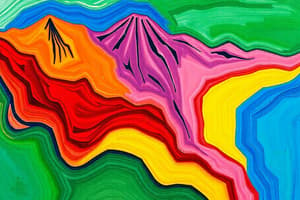Podcast
Questions and Answers
What are the primary natural features studied in physical geography?
What are the primary natural features studied in physical geography?
- Economic activities of different regions
- Cultural landscapes and urban areas
- Natural features such as mountains and rivers (correct)
- Human-made structures like buildings and roads
Which of the following is NOT a component of the water cycle?
Which of the following is NOT a component of the water cycle?
- Precipitation
- Evaporation
- Deforestation (correct)
- Condensation
Which type of soil is characterized by high drainage and aeration?
Which type of soil is characterized by high drainage and aeration?
- Loamy
- Peaty
- Sandy (correct)
- Clay
What is the main process by which glaciers impact landforms?
What is the main process by which glaciers impact landforms?
What phenomenon is closely tied to the distribution of species and ecosystems in biogeography?
What phenomenon is closely tied to the distribution of species and ecosystems in biogeography?
What is the primary method used in Geographic Information Systems (GIS)?
What is the primary method used in Geographic Information Systems (GIS)?
Which climate zone is characterized by a high degree of biodiversity?
Which climate zone is characterized by a high degree of biodiversity?
What type of erosion is primarily caused by water?
What type of erosion is primarily caused by water?
Which factor does NOT influence the physical geography of a region?
Which factor does NOT influence the physical geography of a region?
What is the main focus of regional geography?
What is the main focus of regional geography?
Flashcards are hidden until you start studying
Study Notes
Physical Geography
-
Definition: Study of natural features and processes of the Earth’s surface.
-
Key Components:
- Landforms: Mountains, valleys, plateaus, plains.
- Formed by tectonic activity, erosion, and sediment deposition.
- Climate and Weather:
- Climate zones: Tropical, temperate, polar.
- Weather patterns: Influence of ocean currents and geographical features.
- Soil:
- Types: Sandy, clay, loamy.
- Importance for agriculture and ecosystems.
- Hydrology:
- Water bodies: Rivers, lakes, oceans.
- Water cycle: Evaporation, condensation, precipitation.
- Biogeography:
- Distribution of ecosystems and species.
- Influence of climate and geography on biodiversity.
- Landforms: Mountains, valleys, plateaus, plains.
-
Processes:
- Erosion: Wearing away of surface materials by wind, water, and ice.
- Weathering: Breakdown of rocks through physical, chemical, and biological processes.
- Glaciation: Impact of glaciers on landforms and ecosystems.
- Volcanism: Formation of landforms from volcanic activity.
-
Human Interaction:
- Impact of urbanization on natural landscapes.
- Deforestation and its effects on climate and soil.
- Conservation efforts for physical geography preservation.
-
Regional Geography:
- Study of physical features in specific regions (e.g., Himalayas, Amazon Basin).
- Differences in climate, vegetation, and landforms across regions.
-
Tools and Techniques:
- Geographic Information Systems (GIS): Mapping and analysis.
- Remote sensing: Satellite imagery for landform and environmental studies.
- Field surveys: Collection of data for physical features and processes.
Definition and Overview
- Physical geography examines the Earth's natural features and processes, encompassing landscapes and environmental dynamics.
Key Components
-
Landforms
- Types include mountains, valleys, plateaus, and plains.
- Formation driven by tectonic activity, erosion, and sediment deposition.
-
Climate and Weather
- Climate zones categorized as tropical, temperate, and polar.
- Weather patterns influenced by ocean currents and regional geography.
-
Soil
- Different types: sandy, clay, and loamy, each with distinct characteristics.
- Essential for agriculture and sustaining diverse ecosystems.
-
Hydrology
- Key water bodies include rivers, lakes, and oceans.
- The water cycle consists of evaporation, condensation, and precipitation.
-
Biogeography
- Studies distribution patterns of ecosystems and different species.
- Climate and geography significantly influence biodiversity.
Processes Affecting Physical Geography
-
Erosion
- The gradual wearing away of earth materials caused by wind, water, and ice.
-
Weathering
- Breakdown of rocks via physical, chemical, and biological processes.
-
Glaciation
- Glaciers reshape landforms and impact surrounding ecosystems.
-
Volcanism
- Volcanoes create new landforms and alter landscapes through eruptions.
Human Interaction and Impact
- Urbanization alters natural landscapes, often leading to habitat destruction.
- Deforestation has significant repercussions on climate and soil health.
- Conservation initiatives aim to preserve physical geography and its features.
Regional Geography Focus
- Investigates physical features within specific areas, such as the Himalayas and Amazon Basin.
- Highlights regional variations in climate, vegetation, and landforms.
Tools and Techniques
-
Geographic Information Systems (GIS)
- Enables mapping and analysis of geographical data.
-
Remote Sensing
- Utilizes satellite imagery to study landforms and environmental conditions.
-
Field Surveys
- Involves on-site data collection to analyze physical features and processes.
Studying That Suits You
Use AI to generate personalized quizzes and flashcards to suit your learning preferences.




